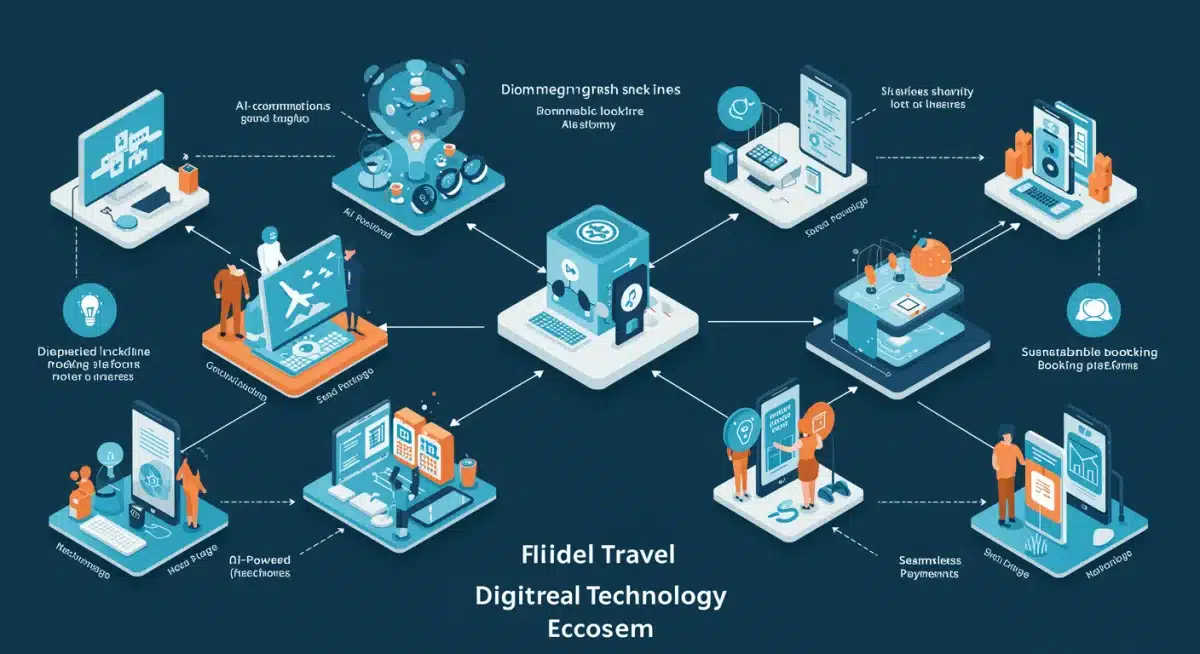2025 Travel Tech Market: U.S. Consumer Experience Innovations

The 2025 Travel Technology Market: Innovations Driving U.S. Consumer Experience and Efficiency is rapidly advancing, with new data indicating a significant surge in AI-driven personalization and sustainable travel solutions directly impacting U.S. travelers.
As of late 2024, the landscape of travel for U.S. consumers is undergoing a profound transformation. The 2025 Travel Technology Market: Innovations Driving U.S. Consumer Experience and Efficiency is not just a forecast but a current reality, with new platforms and tools emerging daily to reshape how Americans plan, book, and experience their journeys. What does this mean for your next trip?
AI and Hyper-Personalization Redefine Travel Planning
Artificial Intelligence (AI) stands at the forefront of innovation within the 2025 Travel Technology Market, fundamentally altering how U.S. consumers interact with travel services. Recent reports from industry analysts highlight AI’s pivotal role in creating hyper-personalized travel itineraries and recommendations, moving beyond simple preferences to anticipate needs and desires based on extensive data analysis.
This shift means travelers are no longer sifting through generic options. Instead, AI algorithms are now capable of curating entire trips, from flight and accommodation suggestions to local activities and dining experiences, all tailored to an individual’s unique profile, past behaviors, and even real-time contextual factors like weather or local events. This level of customization significantly enhances the consumer experience, making travel planning less arduous and more exciting.
Predictive Analytics for Seamless Journeys
One of the most impactful applications of AI in the 2025 Travel Technology Market is predictive analytics. This technology analyzes vast datasets to forecast travel patterns, demand fluctuations, and potential disruptions, allowing providers to proactively offer solutions and travelers to make more informed decisions. For U.S. consumers, this translates into:
- Optimized flight pricing and availability alerts.
- Personalized recommendations for off-peak travel times.
- Proactive notifications about potential delays or cancellations.
Such foresight minimizes stress and maximizes efficiency, a critical factor for today’s busy traveler. The integration of AI extends beyond booking, influencing in-destination experiences as well, with AI-powered chatbots and virtual assistants providing real-time support and recommendations.
The Rise of Contactless and Biometric Solutions
The push for enhanced efficiency and health safety continues to accelerate the adoption of contactless and biometric technologies across the U.S. travel sector. These innovations are becoming standard, streamlining processes from airport check-ins to hotel access, and significantly improving the speed and security of travel for consumers.
Biometric authentication, including facial recognition and fingerprint scanning, is now more prevalent at U.S. airports for security checkpoints and boarding. This not only reduces wait times but also offers a heightened sense of security and convenience, eliminating the need for physical documents at multiple touchpoints. The momentum behind these advancements indicates a future where physical interactions are minimized, making travel smoother and more hygienic.
Secure and Swift Travel Experiences
The integration of biometrics is not limited to airports. Hotels are increasingly utilizing facial recognition for check-in and digital keys accessible via smartphones, allowing guests to bypass front desk queues entirely. This trend is a direct response to consumer demand for faster, more secure, and less cumbersome travel processes, a key driver in the 2025 Travel Technology Market.
- Faster airport security and boarding.
- Seamless hotel check-in and room access.
- Reduced physical contact points, enhancing hygiene.
These technologies are not just about convenience; they represent a fundamental shift towards a more integrated and secure travel ecosystem, prioritizing the traveler’s experience above all else. The data security implications are also being addressed with advanced encryption and privacy protocols, as reported by leading tech firms in the travel space.
Sustainable Travel Technology and Eco-Conscious Choices
Sustainability is no longer a niche concern but a central pillar of the 2025 Travel Technology Market. U.S. consumers are increasingly seeking eco-friendly travel options, and technology is rising to meet this demand by providing innovative solutions that promote responsible tourism and reduce environmental impact.
New platforms are emerging that allow travelers to easily assess the carbon footprint of their journeys, from flights to accommodations, and even offer options to offset their emissions. These tools provide transparency and empower consumers to make more environmentally conscious decisions, driving demand for sustainable practices across the industry. Airlines and hotels are responding by integrating green technologies and reporting their sustainability efforts through these tech-enabled channels.
Tools for Responsible Tourism
The innovation in sustainable travel tech extends to in-destination experiences as well. Apps now guide travelers to eco-certified businesses, promote local and ethical tourism, and even facilitate participation in conservation efforts. This technological push is not only about reducing harm but actively contributing to positive environmental and social impact.
- Carbon footprint calculators for flights and accommodations.
- Booking platforms prioritizing eco-certified hotels and tours.
- Apps promoting local, sustainable transportation options.
As awareness grows, the adoption of these technologies is expected to surge, making sustainable travel an accessible and integral part of the overall U.S. consumer experience. This trend reflects a broader societal shift towards environmental responsibility, amplified by technological innovation.

Enhanced Connectivity and Immersive Experiences
The 2025 Travel Technology Market is also characterized by a significant leap in connectivity and the emergence of more immersive travel experiences. High-speed internet access, often free and ubiquitous, is becoming a standard expectation for travelers, enabling seamless navigation, communication, and entertainment throughout their journeys.
Beyond basic connectivity, augmented reality (AR) and virtual reality (VR) technologies are beginning to offer new dimensions to travel. While still in nascent stages for mass adoption, AR apps are providing interactive guides for exploring destinations, overlaying historical information onto real-world landmarks, or helping travelers navigate complex environments. VR, on the other hand, is being used for pre-trip visualization, allowing consumers to ‘experience’ a destination before booking, thereby enhancing decision-making and excitement.
Augmented and Virtual Reality in Travel
These immersive technologies are not just gimmicks; they are powerful tools for enhancing the consumer journey at various stages. From virtual tours of hotel rooms to AR-powered language translation tools, the potential for these innovations in the 2025 Travel Technology Market is vast and continually expanding. They aim to bridge the gap between planning and experiencing, making travel more accessible and engaging.
The increasing sophistication of mobile devices and the rollout of 5G networks are crucial enablers for these rich, data-intensive applications. As reported by tech industry leaders, the focus is on creating seamless, intuitive experiences that blend the digital and physical worlds, offering unprecedented levels of engagement for U.S. travelers.
Blockchain and Data Security in Travel
As the volume of personal data exchanged in the travel ecosystem continues to grow, the importance of robust data security measures becomes paramount. Blockchain technology is emerging as a critical innovation within the 2025 Travel Technology Market, offering enhanced security, transparency, and efficiency for various travel-related transactions and data management.
Blockchain’s decentralized and immutable ledger system is being explored for secure identity management, loyalty programs, and even payment processing. This technology can protect sensitive traveler information from cyber threats and fraud, building greater trust between consumers and travel providers. Furthermore, it can streamline complex processes like visa applications and baggage tracking, making them more efficient and tamper-proof.
Revolutionizing Trust and Transparency
The application of blockchain in travel promises to revolutionize how data is handled, providing a new layer of security and transparency that benefits both consumers and businesses. For U.S. travelers, this means:
- More secure handling of personal identification data.
- Transparent and verifiable loyalty program points.
- Reduced risk of fraud in bookings and payments.
While still in developmental phases for widespread adoption, the potential for blockchain to fortify the digital infrastructure of the 2025 Travel Technology Market is undeniable. Several pilot programs are currently underway, as confirmed by tech firms specializing in distributed ledger technologies, aiming to integrate these capabilities into mainstream travel platforms.
Integrated Platforms and Seamless User Journeys
The trend towards integrated platforms is a defining characteristic of the 2025 Travel Technology Market, aiming to create seamless, end-to-end user journeys for U.S. consumers. No longer are travelers forced to juggle multiple apps and websites for different aspects of their trip; instead, comprehensive platforms are emerging that consolidate planning, booking, in-trip management, and even post-trip feedback into a single, cohesive interface.
These super-apps leverage API integrations and robust data sharing agreements between various service providers – airlines, hotels, car rentals, tour operators – to offer a unified experience. This not only simplifies the travel process but also enhances efficiency by minimizing friction points and ensuring consistent information flow across all touchpoints. The goal is to make travel as effortless as possible, from inspiration to return.
The Era of All-in-One Travel Solutions
The development of these integrated platforms is driven by consumer demand for convenience and a desire for a holistic view of their travel plans. Companies are investing heavily in creating intuitive interfaces that provide personalized dashboards, real-time updates, and proactive support, all within one application.
- Consolidated booking and itinerary management.
- Real-time updates and notifications across all services.
- Unified customer support and communication channels.
This integration is a critical component of the enhanced consumer experience within the 2025 Travel Technology Market, setting a new standard for ease of use and comprehensive service delivery. Industry analysts predict that these all-in-one solutions will dominate the market, as consumers prioritize efficiency and convenience above all else.
| Key Innovation | Impact on U.S. Travel |
|---|---|
| AI & Hyper-Personalization | Tailored itineraries, predictive insights, and real-time assistance for seamless planning and in-trip experiences. |
| Contactless & Biometrics | Faster, more secure airport processes, streamlined hotel check-ins, and enhanced overall convenience. |
| Sustainable Travel Tech | Tools for carbon footprint analysis, eco-conscious booking, and promotion of ethical tourism choices. |
| Integrated Platforms | All-in-one apps consolidating planning, booking, and in-trip management for a cohesive user journey. |
Frequently Asked Questions About 2025 Travel Tech
AI is now delivering hyper-personalized travel itineraries by analyzing individual preferences, past behaviors, and real-time data. This includes tailored flight, accommodation, and activity suggestions, making travel planning significantly more efficient and aligned with specific consumer desires, moving beyond generic recommendations to truly bespoke experiences.
By 2025, biometrics, such as facial recognition, are increasingly common at U.S. airports for security and boarding, reducing wait times and enhancing security. Hotels also utilize biometrics for seamless check-in and digital room access, significantly streamlining the travel process and minimizing physical contact for travelers’ convenience and safety.
Technology in 2025 offers tools like carbon footprint calculators for flights and accommodations, alongside booking platforms that prioritize eco-certified options. Apps guide travelers to sustainable businesses and promote ethical tourism, empowering U.S. consumers to make environmentally conscious decisions and fostering responsible travel practices across the industry.
While not yet universally common, AR and VR technologies are gaining traction in the 2025 Travel Technology Market. AR apps provide interactive guides and real-time information at destinations, while VR offers pre-trip visualizations, allowing travelers to ‘experience’ locations virtually before booking. These enhance engagement and decision-making for U.S. consumers.
Integrated travel platforms are consolidating planning, booking, and in-trip management into single interfaces, creating seamless end-to-end user journeys for U.S. consumers. These all-in-one solutions minimize friction, provide real-time updates across services, and offer unified support, significantly enhancing convenience and efficiency for modern travelers.
What Happens Next
The rapid evolution within the 2025 Travel Technology Market: Innovations Driving U.S. Consumer Experience and Efficiency signals a future where travel is more intuitive, personalized, and responsible. We anticipate continued acceleration in AI capabilities, further integration of biometric security, and a stronger emphasis on sustainable options. Industry watchers should monitor how these technologies converge to create truly seamless and impactful travel ecosystems, especially as consumer expectations for convenience and ethical choices continue to rise.